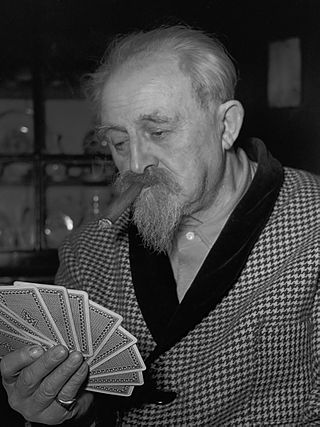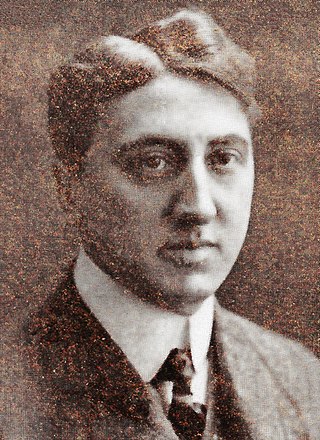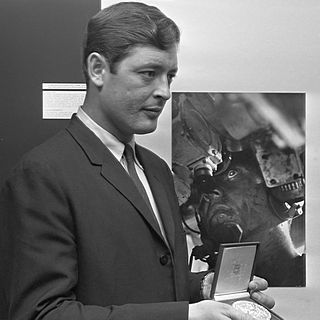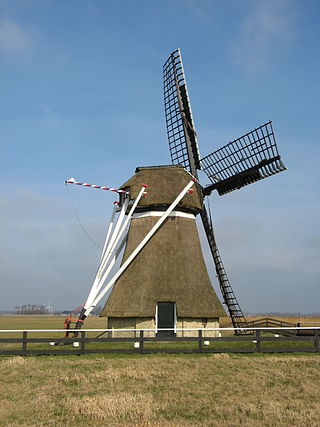
Hugo Grotius, also known as Hugo de Groot or Huig de Groot, was a Dutch humanist, diplomat, lawyer, theologian, jurist, statesman, poet and playwright. A teenage prodigy, he was born in Delft and studied at Leiden University. He was imprisoned in Loevestein Castle for his involvement in the controversies over religious policy of the Dutch Republic, but escaped hidden in a chest of books that was transported to Gorinchem. Grotius wrote most of his major works in exile in France.

The Groeningemuseum is a municipal museum in Bruges, Belgium, built on the site of the medieval Eekhout Abbey.

The Netherlands competed at the 1960 Summer Olympics in Rome, Italy. 110 competitors, 80 men and 30 women, took part in 54 events in 13 sports.

Flemish painting flourished from the early 15th century until the 17th century, gradually becoming distinct from the painting of the rest of the Low Countries, especially the modern Netherlands. In the early period, up to about 1520, the painting of the whole area is typically considered as a whole, as Early Netherlandish painting. This was dominated by the Flemish south, but painters from the north were also important. Dutch and Flemish Renaissance painting, of which Antwerp became the centre, covers the period up to about 1580 or later, by the end of which the north and south Netherlands had become politically separated. Flemish Baroque painting was especially important in the first half of the 17th century, dominated by Rubens.

Hugo von Tschudi (1851–1911) was an art historian and museum curator. He was director of the Nationalgalerie in Berlin (1896–1909) where he acquired many important Impressionist works. Tschudi was born in Austria and became a naturalised Swiss citizen.

Johannes Carolus Bernardus (Jan) Sluijters, or Sluyters was a Dutch painter and co-founder of the Moderne Kunstkring.
Toffe Jongens onder de Mobilisatie is a 1914 Dutch silent comedy film directed by Jan van Dommelen.
Oorlog en vrede is a 1918 Dutch silent war drama film directed by Maurits Binger. It is named after the novel War and Peace by Leo Tolstoy, but is not an adaptation of it. It follows three families during World War I. Only a single fragment of the film survives.

Jan van Dommelen was a Dutch film actor of the silent era. He appeared in 44 films between 1911 and 1939.

Diepenbeek Castle is a castle in Diepenbeek near Hasselt in the province of Limburg, Belgium. The building consists of a 15th-century keep with a 17th-century main block. It was once the establishment of the steward of the nearby Commandery of Alden Biesen, whence the alternative name.

Antonius Adrianus Gerardus Maria "Ronald" van Raak is a Dutch politician, non-fiction writer and former academic. A member of the Socialist Party, he has been a member of the House of Representatives since 30 November 2006. He focuses on matters of home affairs, kingdom relations, the royal house and general affairs. From 2003 to 2006, he was a Senator of the Netherlands.
Monsieur Hawarden is a 1968 Belgian-Dutch drama film directed by Harry Kümel. The film was selected as the Dutch entry for the Best Foreign Language Film at the 42nd Academy Awards, but was not accepted as a nominee.

Jacobus Willem Rentmeester, nicknamed "Co" or "Ko", is a Dutch rower. He later became a photojournalist and covered the Vietnam War among other newsworthy events.
Ko Rentmeester may refer to:

De Rentmeester is a smock mill in Menaam, Friesland, Netherlands which was built in Dronryp in 1857 and moved to a new site at Menaldum in 1982, replacing a mill that had burnt down. The mill has been restored to working order. It is listed as a Rijksmonument.
Albrecht van Loo was a Dutch Grand pensionary.

Hugo Krabbe was a Dutch legal philosopher and writer on public law. Known for his contributions to the theory of sovereignty and the state, he is regarded as a precursor of Hans Kelsen. Also Krabbe identified the state with the law and argued that state law and international law are parts of a single normative system, but contrary to Kelsen he conceived the identity between state and law as the outcome of an evolutionary process. Krabbe maintained that the binding force of the law is founded on the "legal consciousness" of mankind: a normative feeling inherent to human psychology. His work is expressive of the progressive and cosmopolitan ideals of interwar internationalism, and his notion of "sovereignty of law" stirred up much controversy in the legal scholarship of the time.
This page is based on this
Wikipedia article Text is available under the
CC BY-SA 4.0 license; additional terms may apply.
Images, videos and audio are available under their respective licenses.










